Throughout any injury, setback or health problem, there are a lot of challenges that arise and it took me a long time to realise these struggles that I was battling with and then how to overcome them. Here is some information on challenges I experienced and what I found worked for me in negating these. I believe that these translate across various injuries, setbacks and health problems as a lot of the principles are the same in these unfortunate experiences.
STRUGGLES I HAVE FACED
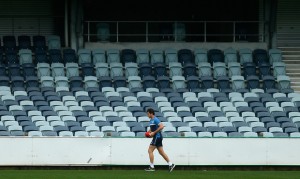 LACK OF INVOLVEMENT — This comes in training and with my teammates, this is really tough as you cannot train, you cannot play, you cannot do what you want to and that is be with your teammates on the footy field every week and feel normal. This is something that is hard to deal with and helps if others are aware of this struggle along with the athlete realising that this is a normal thing to get your head around.
LACK OF INVOLVEMENT — This comes in training and with my teammates, this is really tough as you cannot train, you cannot play, you cannot do what you want to and that is be with your teammates on the footy field every week and feel normal. This is something that is hard to deal with and helps if others are aware of this struggle along with the athlete realising that this is a normal thing to get your head around.
CONSTANT REMINDER — In my setback, my knee soreness unfortunately at times of the rehab was constantly there, I would feel it walking with every step, and this made it hard to shift my focus away from my knee. Unfortunately, because everyone close to me or even the broader community knew that I had some kind of long term setback with my knee, I would get asked about it frequently which brought me back to thinking about my knee all the time. I got known for my knees and that was the first question I got asked by anyone, whether it be a stranger at the
supermarket or a teammate, how is your knee? This made it extremely difficult to avoid thinking about this setback and escaping mentally. I always tried to be conscious of this and it is important to be aware of this happening and being able to give everyone who asks the question the time of day to reply as people only ask because they care. Don’t lose focus of that.
REPETITIVE REHAB — Unfortunately with a health problem, it can last for an extended period of time. An ACL recovery time is at least 9 months, it’s not a 6-8 week injury, its 40+ weeks. This means that the rehab is going to be 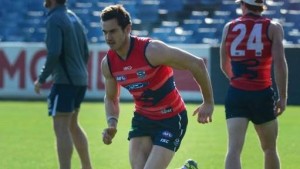 long and tough at times. You cannot always be up and about and so it is important to realise that. I learnt that setting small goals, week to week goals were extremely beneficial. If you are just looking 6 months down the track then it is really difficult. Have your goals for each week and then if you don’t achieve them, you just start again next week. But once you do achieve them, be proud of what you have completed and take confidence from the achievement as now you are one step closer.
long and tough at times. You cannot always be up and about and so it is important to realise that. I learnt that setting small goals, week to week goals were extremely beneficial. If you are just looking 6 months down the track then it is really difficult. Have your goals for each week and then if you don’t achieve them, you just start again next week. But once you do achieve them, be proud of what you have completed and take confidence from the achievement as now you are one step closer.
DOUBTS — This is something that athletes and everyday people face when they are fit and healthy. It is that much more difficult when you are injured or have health issues. You will question where you are at and if you can beat this setback. This something that I have been very fortunate with. The club has backed me every time which has took the thoughts and questions about my future straight out of it. Sports clubs are great places to be at and are usually run by good people who will support you all the way. Physiotherapists and Doctors also play a big role in this and must be positive and upbeat throughout the rehab. I never once questioned in my rehab whether I would be able to make it back, I always believed and knew I would. You have to have real self-belief in yourself. But with good reason too, you are putting in the work and countless hours to get yourself better and it’s not for nothing, mentally you’ll be much stronger for your experience and this will mean you’ll be more than ready by the time you come back. Then as you do come back you will feel ready but still have questions, you will be nervous and scared but that is normal because you care. Don’t underestimate the work that you have put in and once you make it back be really proud of what you have achieved.
FRUSTRATING SETBACKS – There are always going to be setbacks in a long term rehab, whether they are minor that cost you one day or really severe, they are difficult to get your head around. I put pressure on myself throughout my rehabs as I believed that I had been through it multiple times and therefore I will be right on top of things and not endure any setbacks. 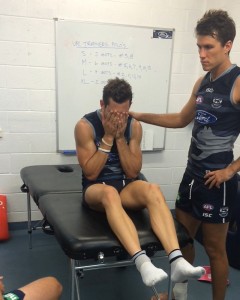 I knew this wasn’t realistic but was hopeful anyway. I wanted the perfect rehab and although I think my fourth one was as good as we could’ve done it, there is no such thing as the perfect rehab in an ACL recovery. One of my physiotherapists once said to me after we had to cut a session short, where does this leave us? Does it rule out a season? Will you remember this day in 3 months? Probably not! Remember that they are a part of the rehab and that you can learn from these. Sometimes a setback might identify an area of the rehab that is not up to the standard that it should be, you might be rushed and therefore this setback can ultimately save you in the long run from doing a severe injury again. Try and learn from these but also understand that it is normal to be frustrated and angry, once again it shows how much it means to you. It also shows how important planning and knowing exactly where you’re at and what you need to do next to ensure that these setbacks don’t occur. For physiotherapists, doctors and sporting clubs, they must also realise what these setbacks can do to the athlete mentally and how it can affect motivation levels.
I knew this wasn’t realistic but was hopeful anyway. I wanted the perfect rehab and although I think my fourth one was as good as we could’ve done it, there is no such thing as the perfect rehab in an ACL recovery. One of my physiotherapists once said to me after we had to cut a session short, where does this leave us? Does it rule out a season? Will you remember this day in 3 months? Probably not! Remember that they are a part of the rehab and that you can learn from these. Sometimes a setback might identify an area of the rehab that is not up to the standard that it should be, you might be rushed and therefore this setback can ultimately save you in the long run from doing a severe injury again. Try and learn from these but also understand that it is normal to be frustrated and angry, once again it shows how much it means to you. It also shows how important planning and knowing exactly where you’re at and what you need to do next to ensure that these setbacks don’t occur. For physiotherapists, doctors and sporting clubs, they must also realise what these setbacks can do to the athlete mentally and how it can affect motivation levels.
MIND GAMES — When you go through any setback, at times it feels very lonely. In an ACL rehab or any major setback, you train on your own for such a long time rehabbing a 9 plus month recovery, but with an even lesser setback, it presents real challenges that you have to conquer within yourself mentally let alone the physical challenge you face. You have to deal with pain, struggles and failure over such a long time before you can get back to running let alone performing at your best. This therefore means that you will have times where mentally you do not feel anywhere near on top of things and your mind will play games on you. Why am I doing this? How am I going to get back? Will I be as good? What do my teammates think of me? Am I going to miss out and so many other questions. This is normal but is really difficult to deal with on your own and from my experiences these games will occur mostly when you have to train or deal with things on your own.
 ROLLER COASTER — Emotionally, through difficult times, such as a health scare or problem, or through a long term rehab, it brings out everything. You cannot be up and about every day, you will face many challenges but also have some real highs and proud moments. The people closest to you have to realise this and be able to identify when you are struggling and when things are going well. It is important that the physiotherapists and or doctor is empathetic and tries to understand their athletes/patients as quite often the athlete won’t open up and be honest with how difficult they are finding things. I personally didn’t open up to my teammates and family completely with when things were good or bad until my third and fourth rehab and when I did this I instantly noticed how much happier and positive I was. This is because it felt like a lot of pressure was lifted and I was able to be myself. Your family, friends and teammates cannot help you unless you let them know what is going on and then they will be more than happy to help. Mental Toughness is not about not showing any vulnerability, it’s about how you respond through adversity and that is by utilising all of your resources available and reaching out to those who are there for you. This is will help you get yourself back to where you belong.
ROLLER COASTER — Emotionally, through difficult times, such as a health scare or problem, or through a long term rehab, it brings out everything. You cannot be up and about every day, you will face many challenges but also have some real highs and proud moments. The people closest to you have to realise this and be able to identify when you are struggling and when things are going well. It is important that the physiotherapists and or doctor is empathetic and tries to understand their athletes/patients as quite often the athlete won’t open up and be honest with how difficult they are finding things. I personally didn’t open up to my teammates and family completely with when things were good or bad until my third and fourth rehab and when I did this I instantly noticed how much happier and positive I was. This is because it felt like a lot of pressure was lifted and I was able to be myself. Your family, friends and teammates cannot help you unless you let them know what is going on and then they will be more than happy to help. Mental Toughness is not about not showing any vulnerability, it’s about how you respond through adversity and that is by utilising all of your resources available and reaching out to those who are there for you. This is will help you get yourself back to where you belong.
WHAT I’VE FOUND HELPS
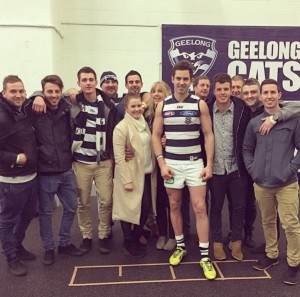 SUPPORT NETWORK — You need to have family and friends as well as your sporting club supporting you as any good mates and family will do. You will feel incredibly alone in this rehab or other setbacks at times and others don’t realise that, how can they, they’re not going through it. When you are
SUPPORT NETWORK — You need to have family and friends as well as your sporting club supporting you as any good mates and family will do. You will feel incredibly alone in this rehab or other setbacks at times and others don’t realise that, how can they, they’re not going through it. When you are
struggling these are the people you bounce off and at times require to keep you positive and focused. Don’t push these people away or try and do it on your own, they will help you. Also allow your teammates or colleagues to understand your struggle and help develop that empathy. Don’t shy away from being around your family, friends, teammates or workplace thus staying involved as the less they see you, the harder it is for them to understand or know how to react to what you are dealing with.
COMMUNICATION – OPENING UP — This is something that took me a while to realise the benefit of doing this. Speaking with someone about it (a close friend/family member or a psychologist) is so important. Even if you think you are on top of things, talking to a psychologist allows you to understand completely why you think about things the way you do and what your rehab is doing to you mentally. This then allows you to understand when you might be flat and why you will be which prepares yourself for these situations allowing you to be more on top of things and all round a happier person. I also had a lot of anxiety built up around my knee and in speaking with my psychologist, we were able work this out and then went about changing my thinking around my knee which ultimately played a massive role in me getting back to playing. In contrast to this, I didn’t open up early on in my setbacks and learnt that there is no point lying to yourself or others and say things are fine when they’re not because it builds up pressure, the more you talk to and let other understand, the less a burden you feel.
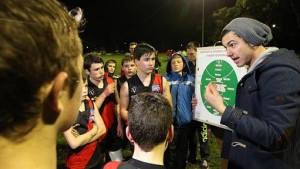 FOCUSES OFF FIELD — This one I believe is incredibly important. When you are recovering from a health problem or setback for a long time you have way too much time to think and you constantly question where you are at.
FOCUSES OFF FIELD — This one I believe is incredibly important. When you are recovering from a health problem or setback for a long time you have way too much time to think and you constantly question where you are at.
Your mind plays games on yourself because it is such a long journey. By having these interests and focuses off the field it means that if your recovery is not going as you would like it too or you are having a bad day, you are then able to turn to these interests to get your positive energy and happiness from this. These have to be hobbies that you enjoy doing as you will spend time on them and therefore turn to these at times of need. Overseas trips or holidays in general are a great thing to break up the recovery and help with timely setbacks as it gives you something to look forward to and gravitate towards. I found that coaching an under 14 footy team was my main outlet to turn to as I was able to coach and develop these kids and it was all about them, taking away any negative thoughts personally or the feeling of my own struggles. I also studied a few courses part time along with commentating footy matches on the radio and catching with my brothers and mates regularly which helped keep me positive as this was an outlet from the repetitive rehab and constant setbacks I was going through at the time.
KNOWING YOUR BODY/MIND – CONFIDENCE — I learnt more and more about my body and mind with every rehab I experienced. There is always room for improvement and you pick up things the more you do them. I knew my body and focused on the positives with my rehab knowing that I was much stronger, more athletic, more powerful, fitter and more durable than when I played previously and knew that this would hold me in a great position when I did get back to playing. We worked on getting into power positions, getting very good technically at keeping my feet under my body and not in vulnerable positions. We tried to improve my running technique and tackling technique as well. I also knew how much I could push my body and where the threshold was. This was not dissimilar with my mind and thought process. I struggled through my first few ACL rehabs to the extent where I was diagnosed with forms of depression on a couple of occasions. I mean, how could you not be depressed at times? It is normal to be upset and disappointed but if you can understand why you are feeling the way you are then that will help you realise that it is ok to be sad and frustrated, to feel the emotions and then move on and overcome these feelings and setbacks. In saying this it probably took until my 4th rehab to completely get on top of this. Keep trying to learn as much about your injury, your body and mind as possible because the mental side plays a major role in recovery time.
 PHYSIOTHERAPISTS/ DOCTORS/ PT’S UNDERSTANDING THEIR ROLE — Your Physiotherapist, Doctor or Personal Trainer is probably going to be the closest person to you in your recovery. This is the person who you will confide in, open up about your setbacks and they will see firsthand your struggles and achievements. It is important that you find a good physiotherapist/doctor/PT who can understand you, is empathetic to the challenges you face and therefore knows when to push you or when to pull back. I had two physiotherapists who are very good at their job, but equally as good at understanding the situation and mentally where I was at. They become a mentor and so the trust between you both is as important as there will be challenging times throughout the rehab where the both of you will be
PHYSIOTHERAPISTS/ DOCTORS/ PT’S UNDERSTANDING THEIR ROLE — Your Physiotherapist, Doctor or Personal Trainer is probably going to be the closest person to you in your recovery. This is the person who you will confide in, open up about your setbacks and they will see firsthand your struggles and achievements. It is important that you find a good physiotherapist/doctor/PT who can understand you, is empathetic to the challenges you face and therefore knows when to push you or when to pull back. I had two physiotherapists who are very good at their job, but equally as good at understanding the situation and mentally where I was at. They become a mentor and so the trust between you both is as important as there will be challenging times throughout the rehab where the both of you will be
tested. It is essential for this trusted person who is close to you to understand how important and how bigger role they can play in your recovery as they are front and centre and experience all of your ups and downs. This is something that I was extremely fortunate with as we have had a great medical team at Geelong. My two physiotherapists, Mark Young and Mike Snelling, were there throughout my 4 ACL rehabs and played huge roles in helping me overcome my physical challenges but more importantly than that, were my mentors in overcoming my mental battles and I owe a lot to them two guys.



